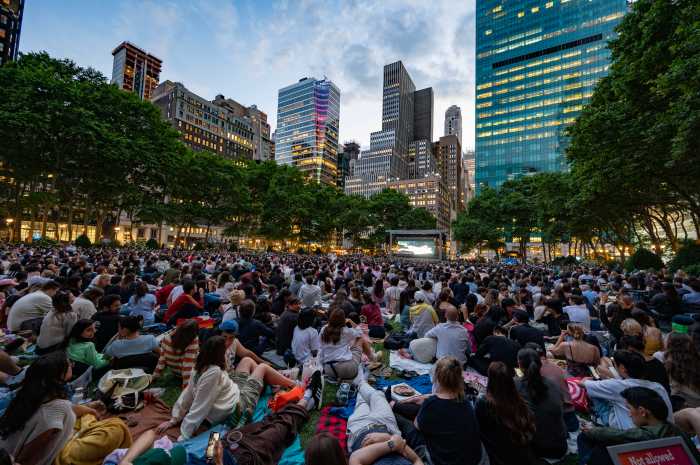The puppies raised in the care of Warrior Canine Connection have seriously big paws to fill: Donning vests made from U.S. military uniforms, they’re trained to help veterans struggling from post-traumatic stress disorder.
A group of service dogs who’ve made it through the Maryland-based charity’s two-year training process are heading to Grand Central Terminal to meet New Yorkers during a Yappy Hour fundraising event this week. When you’re greeted at Michael Jordan’s The Steak House NYC by the wagging tails of furry soldiers, it might be easy to forget they’re far more than just cuddly companions.
“These dogs offer a sense of purpose or continued sense of mission to veterans who may have been wounded or hospitalized for treatment after returning home from combat,” Rick Yount, executive director of WCC, said. He founded the charity six years ago after seeing the impact a pup can have first-hand.
“I was gifted with a golden retriever puppy, Gabe, and was suckered into believing he would die if I didn’t take him to work with me,” Yount recalled. “At the time, I was working with abused, neglected kids and the dog’s healing power became immediately apparent, even at four months of age.”
When soldiers were arriving home from Iraq and Afghanistan in 2008, he knew it was time to start training some puppies to step in and help them recover.
Years later, WCC has up to 60 pups in its care at any given time. (You can watch them grow up on WCC’s live stream). The dogs are “purpose bred,” meaning they’re born at the Maryland headquarters and trained to have a mellow temperament.
“These are dogs I describe as being very laid-back, or I often joke that they’re not from New York. These dogs are your southern country dogs,” Yount said.
Throughout their training, which involves learning to pull wheelchairs and not be alarmed or distracted by noises, each golden or Labrador can help more than 60 veterans during his or her own recovery.
“Rather than just giving them the dog and saying ‘good luck,’ we work with them and train them to relate to the dogs,” Yount explained. “The army trains them to become reactive, and while that’s important in a war zone, they have to practice a tremendous amount of patience and adapt to a different temperament to help raise a service dog.”
Veterans are among the volunteers who help socialize the dogs by taking them out into the public often to learn to interact with humans and get them accustomed to loud noises that may be triggering for those with PTSD.
“If I have a service member who’s struggling with trusting humans after being at war, there’s a clinical relevance to handing them a 3-week-old puppy and tasking them with showing that puppy they can trust people,” Yount said. “It’s a very meaningful and therapeutic process.”
The dogs also go through a physical three-step training procedure in which they’re taught to pick things up when they’re dropped, stop at street corners and figure out how to open doors. Once they’re ready to graduate, they’ll go on to live with one of the vets who may have had a helping hand in their upbringing.
Of course, there are always a few furry soldiers who aren’t made for the therapeutic life.
Dogs who aren’t comfortable in consistently changing environments won’t be sent home with a struggling vet, but they remain in the program in some capacity and may be placed with a military member’s family instead.
“We’ll find something for them. These dogs are living memorials,” Yount said, adding that they’re all named after fallen soldiers. A pup named after FDNY Marshal Ronald Bucca, who died in the Sept. 11 attacks, was placed with a veteran in Arlington, Virginia, this year, he said.
“We’ve had families come down to meet the service dog named after their loved one. They say a warrior is never forgotten as long as a name is spoken. That’s really impactful,” he said.
Thursday’s Michael Jordan’s The Steak House NYC event, to be held between noon and 6 p.m., will help raise money for these soldiers-in-training. Sales of pup-themed cocktails, like “Tito’s Greyhound” and “Tito’s Moscow Mutt,” will help contribute to a $5 donation per sale. All proceeds from MJ’s slow-roasted dog bones ($9, sold at the event) will also go toward the pups. For more information, visit michaeljordansnyc.com.
If you’re interested in donating, visit warriorcanineconnection.org, or send a check to 14934 Schaeffer Road, Boyds, MD 20841.






































